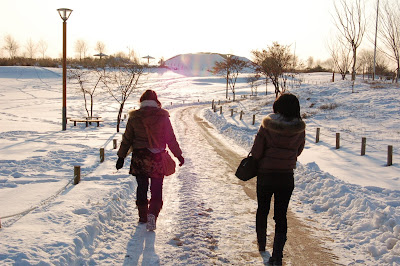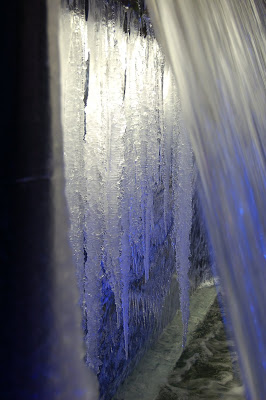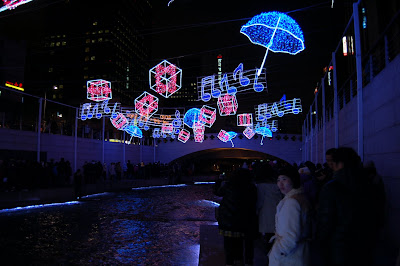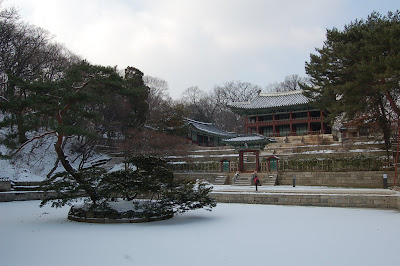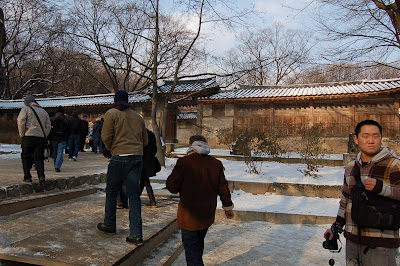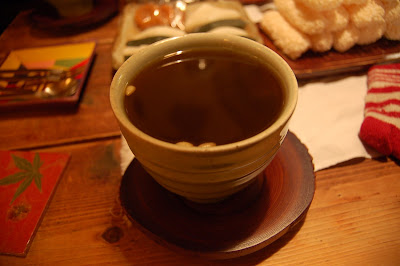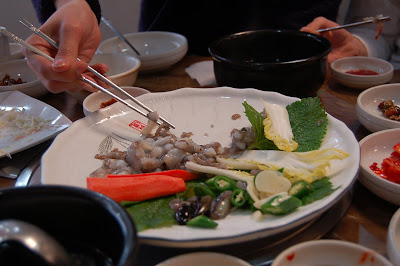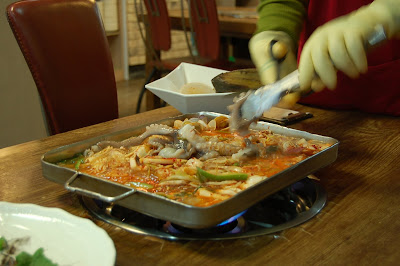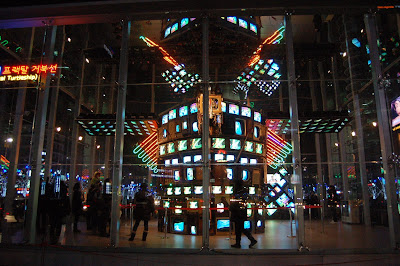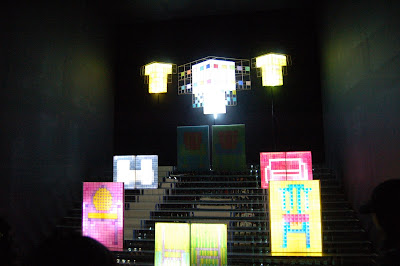My friend Meng Ju planned a trip for this weekend to the Ice Fishing festival in Gyeongsangdo that myself and about 25 other Sogang students joined. We paid a little extra too to do snow sledding and...ice sledding? Hehe, the thought sounds pretty dangerous, but it was pretty different from what we expected when we actually got there (more on that later).
I had to wake up at the early hour of 6:30 to get to the bus on time, but unfortunately, for some reason I didn't hear my alarm at all, so I didn't wake up until Meng Ju called me at 7:30 asking where I was. I quickly tossed on some clothes and dashed out the door, without showering or even brushing my teeth (gross, I know), to catch a taxi to Jonggak where we would take the bus. After a 3-ish hour bus trip we arrived at the festival, where several tents were set up (actually, to be honest, I'm not sure why they were there...) and multiple people were gathered at spots with fishing lines.
 We staked our spots and began to pick at the ice with our ice picks, a task that left my hand still tired today (writing down grammar and vocabulary today was pretty painful) and that was rather futile because of how thick the ice was and because there were ajusshis driving a large ice drill machine around to break the ice for us. Either way, striking the last bit needed to break into the water and cause it to rush up was a very fulfilling feeling!
We staked our spots and began to pick at the ice with our ice picks, a task that left my hand still tired today (writing down grammar and vocabulary today was pretty painful) and that was rather futile because of how thick the ice was and because there were ajusshis driving a large ice drill machine around to break the ice for us. Either way, striking the last bit needed to break into the water and cause it to rush up was a very fulfilling feeling! John being silly and sliding on the ice.
John being silly and sliding on the ice. Jonghyeon striking at the ice.
Jonghyeon striking at the ice. The ajusshis going around with the ice drill.
The ajusshis going around with the ice drill. As I had expected, none of us caught any fish. After all, we didn't really have any real bait--what we received were little vaguely fish-shaped pieces of plastic and also the holes that we drilled were likely single columns of water that didn't house any fish as we were able to hit another ground with the "bait"...Either way, the experience was fun and afterwards we ate delicious VERY fresh (watching the ajummas cut the heads off the trout and gutting and cutting up the squirming bodies was quite gruesome) trout for lunch. Despite not catching any trout, I have to say ice fishing is an experience I probably won't get again any time in the future, although, to be honest, it's not much more exciting than normal fishing (sorry to any fishers out there ^^).
As I had expected, none of us caught any fish. After all, we didn't really have any real bait--what we received were little vaguely fish-shaped pieces of plastic and also the holes that we drilled were likely single columns of water that didn't house any fish as we were able to hit another ground with the "bait"...Either way, the experience was fun and afterwards we ate delicious VERY fresh (watching the ajummas cut the heads off the trout and gutting and cutting up the squirming bodies was quite gruesome) trout for lunch. Despite not catching any trout, I have to say ice fishing is an experience I probably won't get again any time in the future, although, to be honest, it's not much more exciting than normal fishing (sorry to any fishers out there ^^). Afterwards, we flocked to the snow slope to "sled" down in inner tubes, which was a lot of fun and was very much a nice flashback to childhood hehe. No matter how many times we went down that slope, we never tired of it hehe, but eventually we decided that before heading back to Seoul, we should probably try the "ice sledding."
Afterwards, we flocked to the snow slope to "sled" down in inner tubes, which was a lot of fun and was very much a nice flashback to childhood hehe. No matter how many times we went down that slope, we never tired of it hehe, but eventually we decided that before heading back to Seoul, we should probably try the "ice sledding."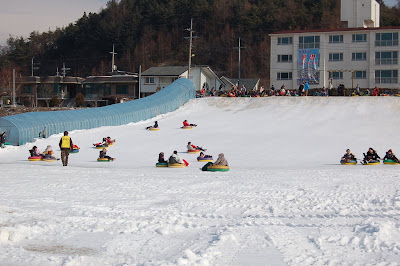
 Just before we took off.
Just before we took off. It turned out to be a lot less freaky than we thought. Most importantly, it wasn't on a slope, nor was it really "sledding" hehe. We got boards--either one person boards where we got picks to glide around on the ice or two person boards to glide around with picks or to have someone else push you around--and skidded along the very solid ice. As another flash back to childhood, we played tag on these "sleds," which was very fun and which everyone enjoyed (disregard the fact that our ages ranged between 20 and 50 hehe).
It turned out to be a lot less freaky than we thought. Most importantly, it wasn't on a slope, nor was it really "sledding" hehe. We got boards--either one person boards where we got picks to glide around on the ice or two person boards to glide around with picks or to have someone else push you around--and skidded along the very solid ice. As another flash back to childhood, we played tag on these "sleds," which was very fun and which everyone enjoyed (disregard the fact that our ages ranged between 20 and 50 hehe). Two person sled!
Two person sled! Shabby single person sleds hehe!
Shabby single person sleds hehe! After that fulfilling day, we gathered back to the bus where the ajusshi bus guide yelled at us for coming back at 3:22 when we should have been back at 3:20...not only that but a fight actually almost started when for some reason our bags had been moved so no one was able to return to their proper seat. Us Sogang kids weren't the only ones on the bus--there was also a family and some other Korean people who were on the trip as well, and when the ajusshi told us to just sit where our bags were, the family explained that they wanted to retain their seats so that their family could sit together, to which the ajusshi repsonded "why can't you all just sit where your bags are?" The argument escalated and eventually led to cursing and name calling from the ajusshi and one of the family members, which then led to walking outside the bus and people holding the bus ajusshi and the man back from striking each other. Eventually, the ajusshi was just moved to another bus (I'm guessing from the same company) and the man returned back and apologized to everyone for creating a scene.
After that fulfilling day, we gathered back to the bus where the ajusshi bus guide yelled at us for coming back at 3:22 when we should have been back at 3:20...not only that but a fight actually almost started when for some reason our bags had been moved so no one was able to return to their proper seat. Us Sogang kids weren't the only ones on the bus--there was also a family and some other Korean people who were on the trip as well, and when the ajusshi told us to just sit where our bags were, the family explained that they wanted to retain their seats so that their family could sit together, to which the ajusshi repsonded "why can't you all just sit where your bags are?" The argument escalated and eventually led to cursing and name calling from the ajusshi and one of the family members, which then led to walking outside the bus and people holding the bus ajusshi and the man back from striking each other. Eventually, the ajusshi was just moved to another bus (I'm guessing from the same company) and the man returned back and apologized to everyone for creating a scene.This brings up a point of one aspect of Korean culture that's very hard for me to get used to. That the merit of age allows one to push others around. As we had also learned in our textbook, if an adult does you wrong, you can't say anything back, even if everyone knows they were the one who did wrong. If you do, you're seen as impolite and will be looked down upon. Maybe it's because of growing up with an American background, but I still personally think that respect is something to be earned, and although I agree with the culture of respecting one's elders (having grown up in an Asian household), I don't think that age gives the right to wrong someone else. I thought the ajusshi was being very obnoxious in not letting us sit back in our seats (apparently he had been the one who moved the luggage around) and was also the one who began the cursing and name calling. Although I do think patience is a virtue and that the man shouldn't have retaliated (as it inconvenienced the rest of us), I do think that the ajusshi was wrong in using his age as a reason to yell at us (another sentence he had yelled was "why are there so many young people on this bus???). After the almost-fight, I heard bits and pieces from the conversation from the family behind us about the ajusshi abusing his age as a status, not being fair, etc. To give other examples of this situation, often on the street or in the subway, ajummas will push past people without even saying a word, not even "excuse me" or giving any warning, a gesture that causes me to get annoyed and think again of this culture point. Maybe it's something I'll never get used to, or maybe I need to open my eyes more? I don't know. I understand it, but it is a tough one to get used to for me.
Eventually, everything settled down and we made our way back to Seoul, where we had dinner together at a delicious samgyupsal place and then finished off our night at noraebang, where we karaoked our voices away ^^! It's trips like these that really allow for bonding time with Sogang students from the other classes :).
 The 8 color samgyupsal (the last one was brought a bit later)!
The 8 color samgyupsal (the last one was brought a bit later)!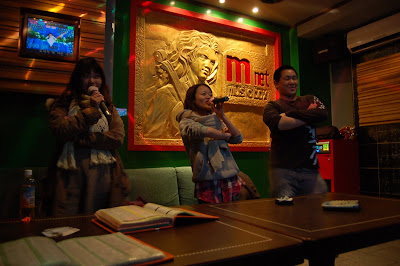 Kana, Pei Wen, and Henry doing the Abracadabra dance.
Kana, Pei Wen, and Henry doing the Abracadabra dance.






